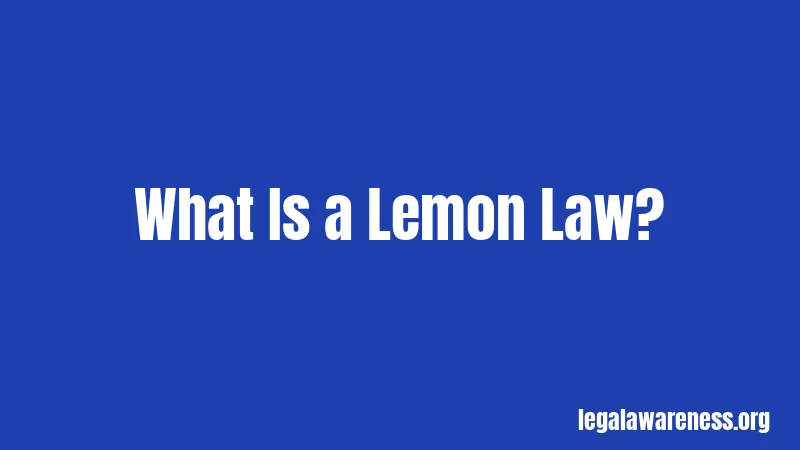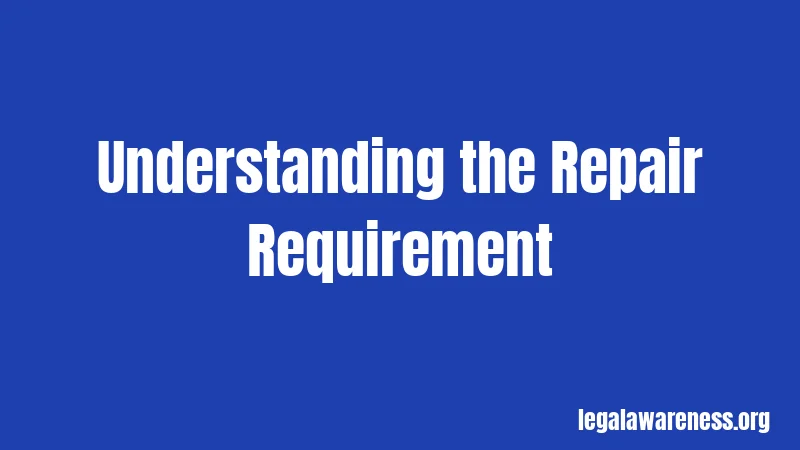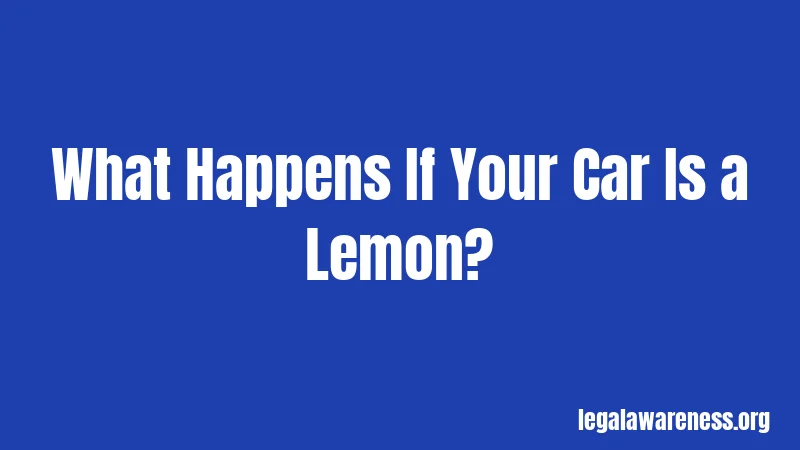New Jersey Lemon Laws in 2026: Knowing Your Rights
Most people have no idea this protection even exists. Seriously. You buy a car that keeps breaking down, and you think you’re stuck with it forever. But here’s the thing—New Jersey has some of the strongest lemon laws in the entire country. And honestly? You need to know about this.
When you buy or lease a vehicle in New Jersey that has serious problems, the law is on your side. The manufacturer has to fix it. If they can’t? They have to buy it back or replace it. Let’s break down exactly what you need to know.
What Is a Lemon Law?

A lemon law is a consumer protection that helps you when a vehicle has defects that won’t go away. Think of it like a guarantee on your car. If the manufacturer sells you a vehicle with serious problems, they’re responsible for fixing them—or giving you your money back.
New Jersey has TWO lemon laws. The first protects buyers of new vehicles. The second protects buyers of used vehicles from licensed dealerships. Both are there to help you. Pretty straightforward, right?
New Jersey’s New Car Lemon Law Basics
What Counts as a “Lemon”?
This is important. Not every problem with your car qualifies. Your vehicle is a lemon under New Jersey law when it has a serious defect. That means the problem affects the car’s use, value, or safety in a significant way.
A broken cupholder? Not a lemon. A steering problem that makes the car unsafe to drive? That’s a lemon. We’re talking about major issues. The defect has to be serious enough that it shakes your confidence in the vehicle.
Here’s what triggers lemon status: your car needs more than three repair attempts for the same problem, OR it’s been in the shop for 20 or more days total within the first 24 months or 24,000 miles (whichever comes first). You’re not alone—this confuses a lot of people.
The Time Window Matters
Stay with me here. The first report of the defect must happen within the first 24 months or 24,000 miles of ownership. But here’s the key part: the repair attempts can happen AFTER that timeframe ends. As long as you reported the problem in time, you’re covered.
You also have four years after the third repair attempt to file a lemon law claim. So you’ve got breathing room. You don’t need to rush.
What the Law Actually Covers
Okay, this part’s important. The lemon law covers passenger cars, trucks, SUVs, motorcycles, motorhomes (not the living quarters), and emergency vehicles. But it does NOT cover vehicles with commercial registration.
The vehicle must be purchased, leased, or registered in New Jersey. And it must be covered under the manufacturer’s warranty—whether that’s an original warranty, extended warranty, or powertrain warranty.
Understanding the Repair Requirement

Let me explain the “three repair attempts” rule more clearly. Your car goes to the dealer. They try to fix the same problem. It doesn’t get fixed, or the problem comes back. That’s attempt one. You go back. Same problem. That’s attempt two. It happens again. That’s attempt three.
If the defect is something that could cause death or serious bodily injury, you might qualify with just ONE failed repair attempt. These are emergency situations—like brake failures or steering issues.
What About the Days Out of Service?
Here’s where it gets interesting. The 20 days don’t have to be consecutive. And they don’t all have to be for the same problem. You could have your car in the shop five times for different issues. As long as those repair days add up to 20 or more during the first 24 months or 24,000 miles, you have a claim.
Wondering if you’re counting correctly? Keep detailed records. Write down every date you drop off your car and every date you pick it up. Document everything. This becomes super important later.
What About Intermittent Problems?
This is where a lot of people get confused. Your car has a weird noise. Sometimes it happens. Sometimes it doesn’t. The dealership says they can’t fix what they can’t hear. That’s fine. It still counts as a repair attempt under the law.
The defect isn’t your fault if it doesn’t show up during the mechanic’s visit. The dealership should spend extra time diagnosing the problem. If your complaint is on record, it counts. That’s it.
New Jersey’s Used Car Lemon Law
Hold on—there’s MORE protection for used cars. If you bought a used vehicle from a licensed New Jersey dealership, you’re covered by the used car lemon law too.
Here are the requirements: The car must be seven model years old or newer. The purchase price must be at least $3,000. The mileage can’t exceed 100,000 miles at the time of purchase.
The warranty length depends on mileage. If the car has 24,000 miles or less, you get 90 days or 3,000 miles of coverage (whichever is longer). Higher mileage vehicles get shorter warranty periods. The dealer is required by law to provide this warranty. No exceptions.
Solid question to ask yourself: Did you buy from a licensed dealership? If yes, you’re covered. Private sales don’t qualify.
What Happens If Your Car Is a Lemon?

Okay, pause. Read this carefully. The manufacturer has three options if your car qualifies as a lemon.
Option One: Full Repurchase
The manufacturer buys the car back from you. You get the full purchase price refunded. That includes your down payment, any trade-in allowance, and every car payment you’ve made. Plus, they pay off any remaining loan balance. Your refund is reduced only by sales taxes, fees, and deductions for excessive wear and tear.
Option Two: Replacement Vehicle
They give you a new car of the same model and value. Many manufacturers prefer this option because it’s cheaper for them. You get a replacement vehicle with the same warranty as the original.
Option Three: Compensation (Under Federal Law)
Under the federal Magnuson-Moss Warranty Act, you might qualify for cash compensation to keep your car AND a refund for some of the value you lost. This applies to vehicles that don’t quite meet New Jersey’s lemon law but still have warranty problems.
Important: The Fee-Shifting Provision
Here’s something amazing about New Jersey’s lemon law. If you WIN your case, the manufacturer pays your attorney fees and court costs. Not you. They do.
This means you can hire a lawyer at zero cost. Seriously, zero. Many lemon law attorneys work on what’s called a “no-win, no-fee” basis. If your case succeeds, the manufacturer pays everyone. If somehow your case doesn’t succeed, you owe nothing. That’s how confident the law is that you deserve protection.
How to File a Lemon Law Claim
Step One: Document Everything
Start right now. Keep copies of all repair receipts. Write down dates, problems, and what the dealer tried to fix. Email yourself a summary after each visit. Save everything.
This documentation is your evidence. It proves the pattern of repairs. Trust me on this one—it matters.
Step Two: Send a Final Repair Notice
Before filing officially, send a certified letter to the manufacturer (not the dealer). Use return receipt requested. Tell them you think you have a lemon law claim. Give them ONE more chance to repair the defect.
This step is required by law. It’s your formal notice. Keep a copy for your records.
Step Three: File Your Application
Submit your application to the New Jersey Division of Consumer Affairs, Lemon Law Unit. You can mail it to:
Office of Consumer Protection Lemon Law Unit
P.O. Box 45026
Newark, New Jersey 07101
You can also call them at 973-504-6226 or email [email protected].
Include all your documentation. Be clear and organized. The Lemon Law Unit reviews your application to see if you qualify for a hearing.
Step Four: Attend the Hearing
If approved, your case goes to the Office of Administrative Law (OAL). You’ll attend a hearing conducted by an administrative judge. Hearings happen in Newark, Trenton, or Atlantic City. You choose the location and date that works best for you.
You can represent yourself OR hire a lemon law attorney. Most people hire an attorney because the manufacturer will have one. The process can take as little as 30 days, but it’s often longer when manufacturers fight it.
Understanding Your Rights During the Process
You Can Use Different Dispute Methods
If the dealer has an informal dispute resolution program, you can try that first. But you’re not required to. You can go straight to the Lemon Law Unit for a formal hearing. Choose whatever path makes sense for you.
You can also file a lawsuit in Superior Court if you prefer. The Lemon Law Unit can answer questions. Call 973-504-6226.
What If the Dealer Refuses to Repair?
Some dealers try to avoid fixing problems. That doesn’t work under this law. Even if the dealer says they can’t find the problem, your complaint counts. Even if the problem is intermittent and doesn’t show up during service, it counts.
Don’t let a dealer talk you out of your rights. Document their response. Keep records.
Recent Changes and Updates
New Jersey’s lemon laws haven’t changed dramatically, but the way they’re enforced keeps improving. The state takes complaints seriously. The Lemon Law Unit processes cases and holds manufacturers accountable.
As of 2025-2026, the basic standards remain the same. Twenty days out of service OR three repair attempts for the same problem within 24 months or 24,000 miles. These are the thresholds. Know them.
Special Situations
What If You Lease Instead of Buy?
The lemon law covers LEASED vehicles too. Same rules apply. Same protections. If you’re leasing and your car is a lemon, the manufacturer must handle it—either by fixing it, replacing it, or ending the lease early with a refund of your payments.
What If You Inherited the Warranty?
You don’t have to be the original owner. If someone transferred the vehicle to you while it was still under warranty, you’re covered. You can enforce the warranty and file a lemon law claim. The law says “any other person entitled by the warranty’s terms to enforce the warranty’s obligations.” That could be you.
What If the Problem Started Before 24,000 Miles But You Report It Later?
You’re good. The first report must happen within 24 months or 24,000 miles. The repairs can happen after. You’ve preserved your rights.
What About Commercial Vehicles?
Here’s something interesting. There’s nothing in the New Jersey law that specifically bans commercial vehicles. So commercial vehicle owners MIGHT qualify. But this gets complicated. Talk to a lemon law attorney if you have a commercial vehicle.
Penalties and Consequences for Manufacturers
If a manufacturer violates the lemon law, they face serious consequences. They have to pay your legal fees. They have to pay your court costs. They have to pay for your repairs. And they might owe additional damages.
The manufacturer can’t just ignore the law and hope you go away. That’s not how it works. The state enforces this aggressively.
If a vehicle is bought back under the lemon law, the title gets branded. It’s stamped with a giant “R – RETURNED TO THE MANUFACTURER UNDER LEMON LAW.” Then it goes on the permanent record. That vehicle gets status “L” on its New Jersey title. Everyone knows it was a lemon. The manufacturer can’t sell it in New Jersey without that branding.
Frequently Asked Questions
Can I file a claim if my first repair attempt was within 24 months but repairs continued after?
Absolutely. Only the FIRST report needs to happen within the timeframe. All repair attempts and days out of service can happen after. You’re covered as long as you reported it in time.
How much does a lemon law attorney cost?
Nothing upfront. If you win, the manufacturer pays. If you lose, you pay zero. It’s that simple.
What if my car has an intermittent problem the dealer can’t reproduce?
It still counts. Your report of the problem counts as a repair attempt. You’re not responsible for making the problem happen on command.
How long does the whole process take?
It can take as little as 30 days, but most cases take several months. Manufacturers often fight the claims, which extends the timeline.
Do I have to attend the hearing?
You can attend yourself or have an attorney represent you. It’s strongly recommended to have an attorney because manufacturers always have legal representation.
What if my warranty expired?
If you reported the defect within the warranty period, you can still file a claim. The repairs can happen after the warranty ends.
Can I keep my car and get compensated instead?
Yes, under the federal Magnuson-Moss Warranty Act. You might qualify for money to compensate you for the defective vehicle while keeping ownership.
What if I leased the vehicle?
The lemon law covers leases too. The manufacturer must fix, replace, or end the lease with a payment refund.
Final Thoughts
Now you know the basics. New Jersey’s lemon law is strong, and it’s designed to protect you. If you buy a vehicle with serious defects, you have rights. You have options. You’re not stuck.
Keep detailed records. Document everything. If you think you have a lemon, reach out to the Lemon Law Unit or find a lemon law attorney. These protections exist for you. Use them.
Stay informed, stay safe, and when in doubt, ask the experts.
References
- New Jersey Division of Consumer Affairs – Lemon Law Unit
- New Jersey Motor Vehicle Commission – Lemon Law Information
- New Jersey Statutes Section 56:12-29 through 56:12-34 (New Car Lemon Law)
- New Jersey Statutes Section 56:8-67 and following (Used Car Lemon Law)
- BBB National Programs – New Jersey Lemon Law Guide
- Federal Magnuson-Moss Warranty Act Information
